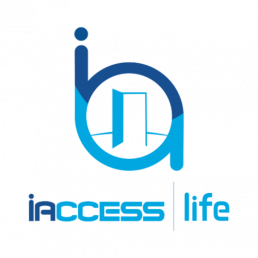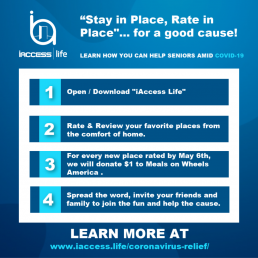Coronavirus Recommendations for the Disabled
COVID-19 is a virus causing respiratory infections belonging to the coronavirus family. While most coronaviruses have relatively mild symptoms, some are more dangerous. Most noteworthy are viruses like SARS, MERS and now COVID-19. These viruses cause more severe symptoms, like pneumonia, kidney failure and in some cases death. COVID-19 is the latest coronavirus sharing these severe symptoms and making its way around the globe. Those with pre-existing health complications are especially at risk. Most people who are infected experience milder symptoms, like fever and a cough. In contrast, older people, and those with underlying medical problems like cardiovascular disease, diabetes, chronic respiratory disease, and cancer are more likely to develop serious illness. Those with disabilities that affect the respiratory and cardiovascular symptoms are immediately at a greater risk. iAccess Life has gathered some helpful Coronavirus recommendations for the disabled below.
Who is most at risk?
- Those with higher grade injuries that have impaired lung function, especially those who depend on the use of a ventilator.
- People with immunocompromised disorders, such as multiple sclerosis, most noteworthy those who require immunosuppression drugs as part of their treatment.
- Anyone with underlying chronic health conditions, such as high blood pressure, heart disease or diabetes.
- The mobility impaired who suffer from underlying acute health conditions, such as skin breakdown or urinary tract infection. Risk of severe symptoms associated with COVID-19 increases for those with SCI injuries. As a result, their risk of severe symptoms increases because their immune system now has to fight two separate issues.
Coronavirus Recommendations for Managing Caregivers
For any of you who rely on a caregiver or personal assistance services, the COVID-19 outbreak may seem especially worrisome. If you are dependent on extra hands to help with daily needs, it may be difficult or even impossible to quarantine yourself as a safety precaution meant to reduce your exposure to the virus. In addition to our coronavirus recommendations for the disabled, we suggest reading our blog post on “Smart Devices for the Disabled” and “Adaptive Clothing” to see if there are any devices or adaptive clothing you can leverage to make you more independent.
A few tips and product recommendations from iAccess Life for navigating these times:
- It is well within your rights to request that your caregivers wear a mask if you know they have been in contact other patients they care, which makes it more likely they may have been exposed to COVID-19, even if they themselves aren’t symptomatic.
- We recommend that you request your caregivers to wash their hands or use hand sanitizer before each time they touch you.
Coronavirus Action Steps for the Disabled
What are you supposed to do if your caregivers stop showing up to work or if your homecare services provider is short staffed? One of the most helpful resources with Coronavirus recommendations for the disabled is this “Action Steps for Attendant Service Users Guide” published by The New York-based Center for Disability Rights.
A few tips from the Centers for Disability Rights for Caregiver Service Users
- Ensure you have sufficient backup caregivers in case your regular caregiver cannot work due to furloughs or illness or if they are not able to reach you for any reason. You will still need assistance, so make sure you have someone who can provide it.
- Have at least a week of non-perishable food in your home at any given time (if possible have two weeks’ supply) and identify people who can assist with shopping. If this is not financially feasible, you may need to seek out assistance from local organizations or food banks.
- Stock up on other important supplies. There may be shortages of other supplies like toilet paper, cleaning supplies, hygiene products and such. You don’t need to hoard these, but plan to keep a supply in your home.
- Identify a way to make sure you can get your medications in a timely manner. This may mean having friends or family assist you or using a pharmacy that offers prescription delivery.
- Use disinfecting wipes on items that are frequently touched. For instance, your telephone, doorknobs, your refrigerator handle, your wheelchair controls, lifting device controls and remote controls. Make this convenient by having wipes near the items that should be regularly cleaned.
Create a Household Plan of Action
One extremely helpful resource we have come across is this Get Your Home Ready guide, published by The CDC. Below are a few tips from the CDC for your Household Plan
- Talk with the people who need to be included in your plan. Meet with household members, other relatives, and friends to discuss what to do if a COVID-19 outbreak occurs in your community and what the needs of each person will be.
- Plan ways to care for those who might be at greater risk for serious complications. There is limited information about who may be at risk for severe complications from COVID-19 illness. From the data that are available for COVID-19 patients, and from data for related coronaviruses such as SARS and MERS, it is possible that older adults and persons who have underlying chronic medical conditions may be at risk for more serious complications.
- Get to know your neighbors. Talk with your neighbors about emergency planning. Moreover, if your neighborhood has a website or social media page, consider joining it to maintain access to neighbors, information, and resources.
- Identify aid organizations in your community. Create a list of local organizations that you and your household can contact in the event you need access to information, health care services, support, and resources. In addition, consider including organizations that provide mental health or counseling services, food, and other supplies.
- Create an emergency contact list. Ensure your household has a current list of emergency contacts for family, friends, neighbors, carpool drivers, health care providers, teachers, employers, the local public health department, and other community resources.
How Can You Help?
If you haven’t already downloaded our app, we encourage you to download below and participate in our Coronavirus relief efforts.
Stay safe, healthy and active. Remember that social distancing doesn’t mean not being social. Have a question? Email us at [email protected]. Or tag us on Instagram, Twitter and Facebook.






